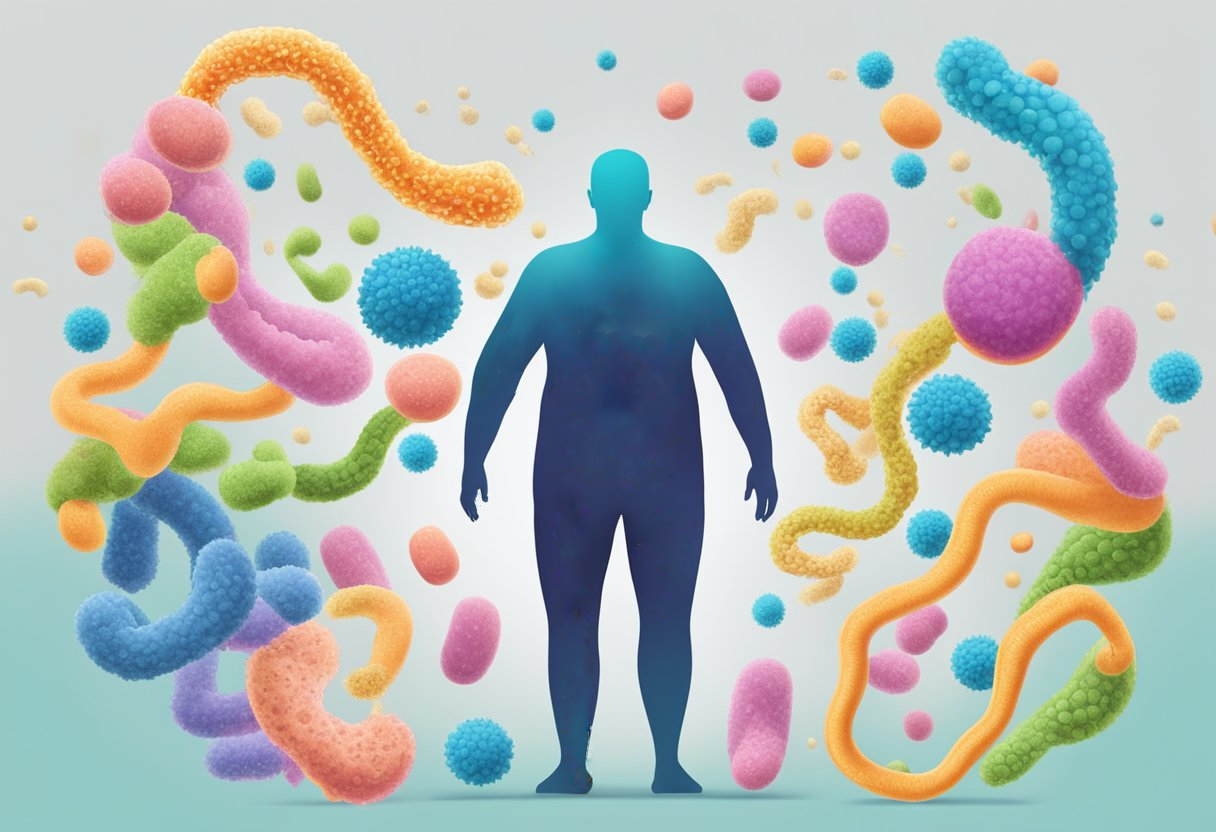Unlocking weight loss begins with understanding the intricate connection between our gut and hormones.
The key is that gut health significantly impacts hormone regulation, metabolism, and, ultimately, weight management.
By maintaining a balanced gut microbiome, we can better control appetite and cravings, thus enhancing our nutritional choices and promoting efficient digestion.

Our digestive system doesn't only break down food; it also produces multiple hormones that affect our hunger, sleep, stress, and mood.
When our gut is healthy, these hormones function optimally, helping us maintain a balanced metabolism, which is crucial for effective weight loss. Addressing gut imbalances can thus prevent unexplained weight gain or loss and improve our overall health.

The process of optimizing gut health involves a combination of probiotics, a balanced diet, and mindful eating practices. Such changes support the gut's ability to produce and regulate important hormones. Simple dietary shifts can significantly benefit our weight loss journey, revealing the transformative power of the gut-hormone connection. For those who want to dive deeper, check out more about probiotics and weight loss at Enerex.
The Hormonal Players in Weight Regulation
In weight regulation, various hormones play fundamental roles. They control appetite, influence metabolism, and affect the way our bodies store and utilize fat.
Insulin and Glucose Control
Insulin is crucial for regulating blood glucose levels. Produced by the pancreas, it helps cells absorb glucose from the blood, maintaining energy balance. High insulin levels can encourage fat storage, contributing to weight gain. Conversely, insulin sensitivity—how effectively the body uses insulin—is vital for maintaining a healthy weight. Insulin resistance, where cells become less responsive, often leads to type 2 diabetes and obesity. Treatments targeting insulin sensitivity are explored to address weight-related issues, linking insulin directly to weight management and metabolic health.
Leptin and Satiety
Leptin, produced by adipose (fat) tissue, signals the brain to reduce appetite when we are full. Known as the "satiety hormone," it helps regulate energy balance by inhibiting hunger. Leptin levels increase with body fat mass, but paradoxically, some individuals develop leptin resistance. Despite high leptin levels, their brains do not receive the signal to stop eating. This resistance complicates weight loss efforts, making leptin a critical focus in obesity research. Enhancing leptin sensitivity may offer viable strategies for effective weight management.

Ghrelin and Appetite Stimulation
Ghrelin, often called the "hunger hormone," is secreted by the stomach. Its primary role is to stimulate appetite, increasing food intake and promoting fat storage. Ghrelin levels rise before meals and fall after eating. This hormone not only impacts hunger but also influences fat distribution and energy use. Research shows that diet-induced weight loss boosts ghrelin levels, making sustained weight loss challenging. Therefore, regulating ghrelin could be essential for long-term weight management, emphasizing its role in appetite control.
Other Hormones Affecting Weight
Several other hormones also impact weight regulation. Cortisol, released during stress, can lead to increased appetite and fat storage, particularly in the abdominal area. Estrogen levels influence fat distribution, mainly affecting women. Glucagon, another pancreatic hormone, works oppositely to insulin by promoting glucose release into the bloodstream, aiding in energy balance. Thyroid hormones regulate metabolism, affecting how fast or slow we burn calories. Low thyroid hormone levels can lead to weight gain, while high levels can cause weight loss. Each of these hormones adds complexity to the mechanisms governing weight and metabolism.
Gut Microbiota's Role in Obesity and Weight Loss

The gut microbiota plays a significant role in weight regulation and obesity. It influences various physiological processes, including energy harvesting and metabolism. The presence of beneficial bacteria through probiotics and prebiotics can further aid in weight management.
Understanding the Gut Microbiome
Our gut microbiome consists of trillions of microorganisms, including bacteria, viruses, and fungi. These microorganisms play a critical role in our digestion and overall gut health. Healthy gut microbiota assist in breaking down complex carbohydrates and proteins, producing essential metabolites for our body. Disruptions in this delicate balance have been implicated in conditions like obesity and poor weight regulation. Factors such as diet, antibiotics, and lifestyle choices can significantly impact the composition of our gut microbiota.

Microbiota and Energy Harvesting
The gut microbiota has a profound influence on how our body harvests energy from food. Some bacteria are more efficient at extracting calories from food, contributing to weight gain and obesity. They convert indigestible fibers into short-chain fatty acids (SCFAs) like acetate, propionate, and butyrate, which are then utilized for energy. This process supports both our metabolism and energy expenditure. Studies suggest that obese individuals tend to have a different microbial composition compared to lean individuals, possibly affecting their hunger signals and fat storage.
| Aspect | Description |
|---|---|
| Influence on Energy Harvesting | The gut microbiota significantly affects how our body extracts energy from food. |
| Efficient Bacteria | Some bacteria are more effective at extracting calories, contributing to weight gain and obesity. |
| Conversion of Fibers | These bacteria convert indigestible fibers into short-chain fatty acids (SCFAs) like acetate, propionate, and butyrate. |
| Utilization of SCFAs | SCFAs are used for energy, supporting metabolism and energy expenditure. |
| Obese vs. Lean Individuals | Obese individuals often have a different microbial composition compared to lean individuals. |
| Impact on Hunger Signals and Fat Storage | The altered microbial composition in obese individuals may influence hunger signals and fat storage. |
Probiotics and Prebiotics
Probiotics and prebiotics are well-known for their positive effects on gut health. Probiotics are live microorganisms found in fermented foods like yogurt and supplements, helping to restore the natural balance of the gut microbiota. Prebiotics, on the other hand, are non-digestible fibers that promote the growth of beneficial bacteria by acting as their food source. Including these in our diet can improve gut function, enhance digestion, and support weight loss. Research indicates that specific strains of probiotics can aid in reducing body fat, influencing energy metabolism, and curbing appetite, potentially alleviating obesity. For instance, a review emphasizes the potential benefits these components can offer in weight management.
Diet and Nutrient Impact on Hormones and Gut Health

Diet significantly influences gut health and hormonal balance. Key nutrients affect the production of hormones, while specific food choices impact gut bacteria and overall health.
The Interplay Between Diet and Hormones
Our diet plays a crucial role in regulating gut hormones. For instance, high-fiber foods promote the release of glucagon-like peptide-1 (GLP-1), which helps regulate glucose tolerance and reduces inflammation. The balance of proteins, fats, and carbohydrates also determines how effectively our body maintains energy balance. Excess calories from high-fat and high-sugar diets can disrupt hormonal functions and lead to issues like fatigue and impaired immunity.
Crucial Nutrients for Hormonal Balance
Fiber, proteins, and micronutrients are vital for maintaining hormonal balance. Fiber-rich foods, such as fruits and vegetables, are essential because they enhance GLP-1 levels, promoting satiety and sustained energy. Proteins support muscle health and help manage hunger hormones. Additionally, micronutrients like vitamins and minerals are necessary for liver function and hormone synthesis. Lack of these nutrients can lead to disruptions in hormone production, impacting energy levels and overall health.

Dietary Choices and Their Effects On the Gut
What we eat directly affects our gut microbiota and hormone production. Diets high in processed foods and sugars can negatively impact gut bacteria, leading to inflammation and poor metabolic health. Conversely, a diet rich in whole foods, such as lean proteins, vegetables, and whole grains, supports a healthy gut environment. This approach enhances hormone regulation, boosts immunity, and promotes better glucose tolerance, ensuring stable energy levels and overall well-being.
For more information on the role of gut hormones in diet-induced weight change, visit this PubMed article.
Lifestyle Factors Influencing the Gut-Hormone Axis

Lifestyle changes, such as exercise, stress management, and sleep patterns, significantly impact the gut-hormone axis, affecting everything from mood to insulin sensitivity. Understanding these influences can provide valuable insights for managing and optimizing health.
Exercise and Its Hormonal Impacts
Exercise is a crucial component in regulating gut hormones. Physical activity increases the release of hormones like GLP-1 and PYY, which help reduce appetite and improve insulin sensitivity. Regular exercise also enhances the diversity of gut microbiota, contributing to better metabolic health and reducing the risk of type 2 diabetes.
Aerobic activities such as running or cycling have been shown to positively influence gut hormone secretion. Even moderate exercise can improve the balance of gut hormones, thereby supporting weight management and addressing obesity issues. Integrating consistent physical activity into our lifestyle can profoundly impact gut hormone regulation and overall health.

Youthful Slim
Tired of the endless fluctuations in body composition? Our all-natural formula is designed to support your journey towards achieving a healthy body composition by helping you feel satisfied, controlling cravings, and maintaining balanced energy levels.
Stress, Sleep, and Hormone Secretion
Stress and sleep patterns greatly influence gut hormone levels. Chronic stress elevates cortisol, which can disrupt gut hormone balance and negatively affect glucose metabolism. Poor sleep quality is linked to reduced levels of leptin and increased levels of ghrelin, leading to heightened appetite and food intake.
Quality sleep is essential for maintaining a healthy gut-hormone axis. Ensuring that we get sufficient and consistent sleep can help regulate hormone secretion, improve mood, and enhance insulin sensitivity. Managing stress through techniques such as mindfulness, meditation, and regular exercise can also mitigate its adverse effects on gut hormones.

Environmental and Behavioral Influences
Environmental factors like smoking and alcohol consumption significantly affect the gut-hormone axis. Smoking can alter gut hormone levels, contributing to metabolic imbalances and an increased risk of obesity. Alcohol consumption can similarly disrupt gut hormone regulation and impair metabolic processes.
Behavioral modifications, such as adopting a balanced diet and avoiding smoking and excessive alcohol intake, can substantially impact gut hormone health. Engaging in stress-relieving activities and maintaining a supportive social network also play essential roles in regulating gut hormones. These proactive steps can lead to better weight management and overall metabolic health.
I hope you found this article valuable and enriching. Your feedback and special requests are always welcome, so don't hesitate to reach out if you'd like to connect or share your thoughts. Until we meet again, stay vibrant, strong, and radiant! 💕 💪🏼 🪞✨


